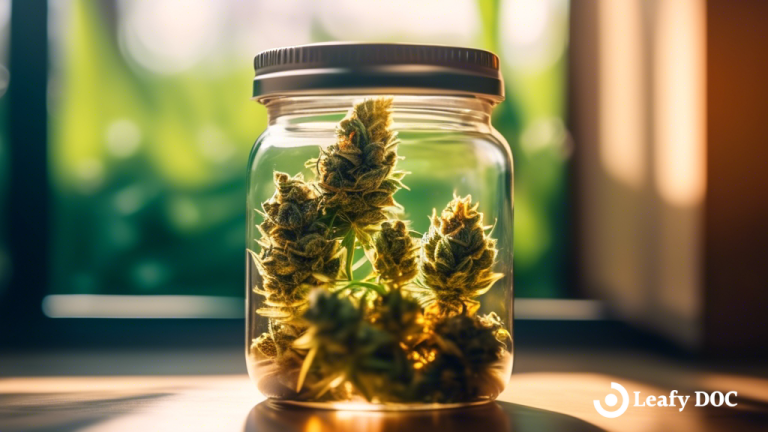Should CBD Be A Part Of Your Wellness Routine?
by Haley Mills · October 19, 2023
Unlock the Power of CBD in Your Wellness Routine: Enhance Your Well-being Today! Discover the untapped potential of CBD and revolutionize your wellness routine. Click here to learn more.

CBD, or cannabidiol, has gained significant attention recently for its potential health benefits. As more and more people seek natural alternatives to traditional wellness practices, CBD has emerged as a popular option. But should CBD be a part of your wellness routine?
In this article, we will look into the science behind CBD and its effects on the body, explore different CBD products available in the market, and discuss the potential risks and considerations associated with CBD use.
CBD is a naturally occurring compound found in the cannabis plant. Unlike its counterpart THC, CBD does not have psychoactive properties, meaning it does not produce a “high” sensation. Instead, CBD interacts with the body’s endocannabinoid system, a complex network of receptors and molecules regulating various bodily functions. Numerous studies have shown that CBD may have potential benefits for a range of conditions, including chronic pain, anxiety, sleep disorders, and inflammation.
By understanding the science behind CBD and the different products available, you can make an informed decision about whether CBD should be a part of your wellness routine.
Understanding CBD and Its Benefits
You may already be aware of CBD’s growing popularity and its potential benefits for your overall wellness routine.
CBD, or cannabidiol, is a natural compound found in the cannabis plant. It is non-psychoactive and doesn’t produce the “high” typically associated with marijuana.
One area where CBD has shown promise is in mental health. Several studies have suggested that CBD may potentially treat anxiety, depression, and insomnia. For example, a 2019 study published in The Permanente Journal found that CBD was associated with decreased anxiety in 79.2% of participants. Another study published in the Journal of Clinical Psychology in 2020 found that CBD may have anti-depressant effects.
In addition to mental health, CBD has also been studied for its potential benefits in pain management. CBD interacts with the body’s endocannabinoid system, which plays a role in regulating pain and inflammation. A 2018 review published in the journal Frontiers in Pharmacology found that CBD may have analgesic properties and could be effective in managing chronic pain. Another study published in Pain in 2017 found that CBD may effectively reduce pain and improve sleep in patients with chronic pain conditions.
While more research is needed to fully understand the effects of CBD on mental health and pain management, the existing evidence suggests that it may be a beneficial addition to your wellness routine.
Exploring Different CBD Products
When comparing CBD to traditional wellness products, it’s important to note that CBD works differently in the body. Traditional wellness products often focus on symptomatic relief, targeting specific issues such as pain or inflammation.
Conversely, CBD interacts with the body’s endocannabinoid system, which plays a role in regulating various physiological processes. This means CBD can potentially promote overall wellness and balance in the body, rather than simply addressing specific symptoms.
Personal experiences with CBD can vary significantly from person to person. Some individuals have reported positive effects such as reduced anxiety, improved sleep, and decreased pain and inflammation. However, it’s important to note that personal experiences are subjective and may not represent everyone’s experience with CBD.
The Science Behind CBD’s Effects on the Body
Exploring the science behind CBD’s effects on the body can provide valuable insights into its potential benefits for overall well-being. CBD, or cannabidiol, is a compound found in the cannabis plant that has gained significant attention for its potential therapeutic properties. Research suggests that CBD may positively affect mental health and pain management.
CBD has shown promise in reducing symptoms of anxiety and depression. Several studies have found that CBD can help alleviate anxiety symptoms in individuals with social anxiety disorder and post-traumatic stress disorder (PTSD). CBD’s believed to interact with the brain’s receptors for serotonin, a neurotransmitter that plays a key role in regulating mood. By influencing serotonin levels, CBD may help improve mood and reduce anxiety.
CBD has been studied for its potential analgesic properties in pain management. CBD interacts with the body’s endocannabinoid system, which regulates pain perception. Studies have shown that CBD can reduce pain and inflammation, making it a potential option for individuals suffering from chronic pain conditions such as arthritis or neuropathic pain.
Incorporating CBD into Your Daily Wellness Routine
Studies have also suggested that CBD may help to promote a sense of calm and relaxation, making it a useful tool for managing stress in daily life. Another area where CBD can be incorporated into your wellness routine is in your skincare routine. CBD has anti-inflammatory properties, which can help to reduce redness and irritation in the skin. It also has antioxidant properties, which can help to protect the skin from environmental damage and signs of aging.
CBD-infused skincare products, such as creams and serums, have become increasingly popular for their potential to improve skin health and appearance. Overall, incorporating CBD into your daily wellness routine can positively impact your well-being. From managing stress to improving skin health, CBD offers a range of potential benefits that can enhance your overall quality of life.
Potential Risks and Considerations for CBD Use
While CBD has gained popularity for its potential health benefits, it’s important to note that there’s limited research on its long-term effects. Most studies on CBD have been conducted on animals or in small human trials, making it difficult to draw definitive conclusions about its safety and efficacy over extended periods of time.
It’s crucial to consult with a healthcare professional before incorporating CBD into your routine, especially if you have any pre-existing medical conditions or are taking any medications.
Another important consideration when using CBD is its potential for drug interactions. CBD can interact with certain medications, affecting how the body metabolizes them. This is because CBD inhibits the activity of certain liver enzymes responsible for breaking down many drugs. As a result, CBD can increase the levels of these drugs in the bloodstream, potentially leading to adverse effects or decreased effectiveness of the medications. Your healthcare provider can help determine the appropriate dosage and monitor your health while using CBD.
Frequently Asked Questions
Can CBD help with weight loss and appetite control?
While CBD has shown promise in stress management and chronic pain, limited scientific evidence suggests it can help with weight loss and appetite control. More research is needed to determine its effectiveness in these areas.
Is CBD safe to use during pregnancy and while breastfeeding?
Using CBD during pregnancy and while breastfeeding may pose potential risks. Research on the effects of CBD on the developing fetus and breastfeeding infants is limited, so it is advisable to consult with a healthcare professional before using CBD in these situations.
How long does it take for CBD to start working?
The time it takes for CBD to start working can vary depending on the individual and the method of consumption. Some people may experience the effects within minutes, while others may take longer.
Can CBD interact with prescription medications?
Yes, CBD can interact with prescription medications. It can potentially cause side effects and drug interactions. It is important to consult with a healthcare professional before incorporating CBD into your wellness routine.
Is it possible to overdose on CBD?
It is highly unlikely to overdose on CBD. Numerous studies suggest that CBD has a good safety profile, with minimal side effects. It may offer potential benefits for mental health and chronic pain management.
Last Updated: August 8, 2024
Get Approved for Your Medical Marijuana Card in Minutes!

Get Your Medical Card
Connect with a licensed physician online in minutes

Like This Article?
Share with your friends
Table of Contents
Keep Reading
-
Discover The Best Cannabis Strains For Sleep
Struggling with sleepless nights? Find out the best cannabis strains for sleep to finally get the rest you deserve. Say goodbye to insomnia and hello to sweet dreams tonight!
-
Managing Mood Disorders With Cannabis: An Emerging Option
Looking for a game-changer in managing mood disorders? Explore how cannabis is revolutionizing treatment options and transforming lives. Click now to discover more about cannabis and mood disorders!
-
Secure Your Medical Marijuanas Card NH: Step-by-Step Process
Get your medical marijuanas card in NH with our step-by-step guide and expert support.



